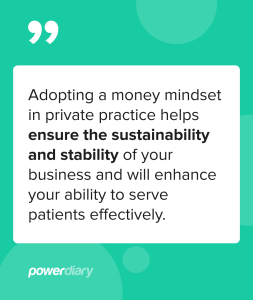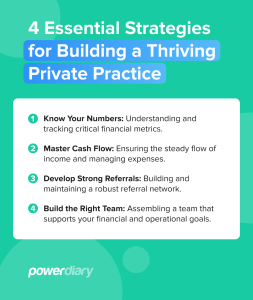Understanding and implementing the right financial strategies can make all of the difference to your practice’s health.
We’re here to help with insights into crucial financial tactics, key metrics to monitor, and actionable tips for adopting a business-minded approach to your health practice.
Plus, Power Diary offers a wealth of tools and resources to help you create a solid financial foundation.
Let’s get started.
The Benefits of a Business-Minded Approach for Your Practice
Even if making financial decisions doesn’t come naturally to you, we believe anyone can learn to take a business-minded approach to running their practice with the right support.
Adopting a money mindset in private practice helps ensure the sustainability and stability of your business and enhances your ability to serve patients effectively.
Here’s why it’s so important:
1. Get Rewarded for Effort and Risk
Starting and running a practice involves significant effort and risk.
A business-minded approach helps ensure you’ll be adequately rewarded for your hard work.
2. Cover Business Costs and Pay Yourself
A solid financial strategy ensures you can cover operational costs and pay yourself a fair salary, contributing to your financial well-being.
3. Hire Additional Practitioners or Support Staff
Financial stability allows you to expand your team when appropriate, by hiring additional practitioners and administrative support staff.
If your practice is doing well and growing, ensuring you can meet patient demand will enhance service quality and ensure your growth is sustainable.
4. Avoid Overwork and Reducing Burnout
Burnout among allied health professionals is a pervasive problem and can affect the level of care provided to patients.
Proper financial management can help you avoid overworking, reduce the all-too-real risk of burnout, and maintain a healthy work-life balance.
5. Increase Financial Resilience
Building financial resilience protects both your business and personal finances, providing a safety net during challenging times.
6. Simplify Decision-Making
A business-minded approach simplifies decision-making processes, like setting fees and payment policies.
For example, offering rates for low-income patients becomes more manageable when your business is financially sound. Profitability enables you to offer discounted rates when needed without putting your practice at financial risk.
7. Increase Options and Flexibility
In Richard Branson’s words, “Money gives you the freedom to do with your time what you want to do with it.”
Making a comfortable profit gives you the flexibility to seize opportunities and navigate challenges without the restriction of limited resources.
The Benefits of a Business-Minded Approach for Your Patients
Adopting a business-minded approach not only strengthens your health practice but also benefits patients.
Here’s how:
1. Continuity of Care
Financial stability ensures your practice can continue operating smoothly, providing uninterrupted care for patients.
2. Focused Practitioners
Practitioners who aren’t overburdened with administrative and financial worries can focus more on their patients’ needs, leading to better care and outcomes.
3. Consistency of Policies and Expectations
A business-minded approach promotes consistent policies and clear expectations, which helps patients understand and respect the practice’s guidelines.
4. Increased Patient Confidence
Clear and firm policies around events like late cancellations and fee adjustment requests increase confidence in your practice.
For example, if a patient requests that you waive a cancellation fee and you have an established policy in place, they’re less likely to take a refusal personally and more likely to understand it as a standard practice procedure.
5. Ability to Provide Charitable Services
Maintaining appropriate rates allows your practice to offer charitable services to those in need.
If your rates are too low for everyone, your practice may struggle to sustain itself and be unable to provide significant help to those who genuinely need it.
On the other hand, a financially sound practice can offer reduced-cost or pro bono services without stress, knowing that doing so won’t jeopardize its overall financial health.
Financial Strategies for a Money Mindset in Private Practice
Let’s get into the nuts and bolts.
Achieving financial success in your allied health practice can be straightforward with the right approach.
We’ll unpack four essential strategies for building a thriving private practice:
- Know Your Numbers: Understanding and tracking critical financial metrics.
- Master Cash Flow: Ensuring a steady flow of income and managing expenses.
- Develop Strong Referrals: Building and maintaining a robust referral network.
- Build the Right Team: Assembling a team that supports your financial and operational goals.
Here’s how:
1. Know Your Numbers
Know and track your practice’s key financial metrics to develop a solid understanding of your business’s health. This will allow you to identify its strengths and areas for improvement.
Here are some critical numbers to monitor:
- Total Practice Income: Often referred to as turnover, this refers to the revenue generated by your business activities.
- Outstanding Payments: To manage your cash flow, you need to be aware of outstanding payments and how overdue they are.
- Owner’s Salary: Consider processing your salary through payroll like any other employee. If you don’t track your own pay, you might overestimate your practice’s profitability.
- Owner’s Dividend: This is a payment from the profit, reflecting the financial success of your practice after covering all expenses.
- New Patient Appointments: Tracking the volume of new patient appointments helps measure the growth and effectiveness of your marketing efforts.
- Average Number of Appointments per Patient: The average number of appointments per patient helps identify drop-offs and possible areas for improvement in patient retention.
- Retention Rate per Practitioner: Monitoring retention rates for each practitioner can highlight strengths and areas needing support within your team.
- Referrers:
- Revenue per Referrer: Identify the revenue generated by each referrer to foster key relationships.
- Identify New Referrers: Track new referrers to help expand your referral network.
- Identify Referrers Who’ve Stopped Referring: Identify when referrers stop sending patients your way to address potential issues and re-engage these partners.
- Customer Satisfaction/Feedback: Use tools like Net Promoter Score (NPS) – even in a modified version – to gauge patient satisfaction and identify areas for improvement.
2. Master Cash Flow
Even the best practices can struggle to stay afloat without consistent cash flow.
Reliable and consistent cash flow ensures you can cover expenses, pay staff, and invest in your practice’s growth.
Here are some practical steps to help you manage and improve your cash flow effectively:
- Prevention is better than cure: Be upfront and clear about your payment policies at every touchpoint. Also, ensure there’s a clear agreement in place that no-show or late fees will be charged to the patient’s card.
- Accept online payments: Make online payments available; this provides convenience for patients and ensures faster payment processing.
- Require a deposit/full payment upon booking: Request a deposit or full payment at the time of booking; this secures the appointment and reduces the risk of last-minute cancellations.
- Send post-appointment invoices automatically: Streamline the invoicing process by automatically sending invoices with payment links after the appointment.
Tips for Managing Overdue Payments
Dealing with overdue payments can be challenging, but addressing them promptly is essential. Effective strategies for managing overdue payments can prevent minor issues from becoming major financial problems.
Here are some practical tips to help you handle overdue payments efficiently and maintain a healthy cash flow:
- Stop providing services, or change the plan: Pause appointments or adjust the service plan until outstanding payments are resolved. This prevents the accumulation of unpaid services, which can amount to hundreds of dollars (or more).
- Set up alerts for pre-payment: If there are overdue payments, keep the appointment in the system but add an alert requiring pre-payment before the appointment is held.
- Send payment reminders automatically: Automate the process of sending payment reminders for outstanding balances. The sooner you start the collection efforts, the better the chances of getting paid.
- Start making collection efforts almost immediately: Act promptly when a payment issue arises. For instance, if a patient’s card is rejected, make a plan with a clear payment date and follow up. If they promise to pay online that night, check the next morning and follow up if necessary.
- Escalation of contact regarding overdue invoices: Adjust the tone and frequency of your contact based on the severity and duration of the overdue payment. Gentle reminders can escalate to more urgent requests as time passes.
3. Develop Strong Referral Relationships
Strong Referrals = Strong Practice
Referrals are the lifeblood of your practice. A steady stream of referrals ensures you always have new patients walking through the door, especially as existing patients transition out of care.
Here’s how to manage referrals effectively:
- Referrers are Customers: Treat your referrers like valued customers. They’re essential to keeping your practice bustling with new patients.
- Simple Needs of Referrers: Referrers need a reliable place to send patients where their issues can be addressed promptly and appropriately.
- Timely and Appropriate Responses: Ensure you can accommodate urgent referrals. If immediate help isn’t possible, communicate clearly and keep the referrer informed with good customer service.
- Clear Expectations: Provide referrers with clear information about what their patients can expect. This builds confidence in the consistency of the patient experience.
- Feedback Loop: Keep referrers in the loop with basic information about their patients’ progress. This ensures they can continue their part of the treatment with all the necessary information. This assumes the client has consented to the allied health practitioner providing feedback to their General Practitioner (or other referring practitioner, as applicable).
4. Build Your Team
Building a successful team is about more than filling positions; it’s about creating an environment where clinicians feel valued and supported.
Think of your clinicians as customers. Consider what you’re offering them and what’s important to them.
Consider these tips for building a strong, committed team:
- Missionaries vs. Mercenaries: You should offer competitive remuneration, but if the only thing you offer is the highest pay, you’ll attract those who are primarily motivated by money. You’ll attract more dedicated and satisfied team members if you also provide a comfortable, positive work environment and advancement opportunities.
- Balanced Offering: Combine competitive pay with other benefits like flexibility, collegial support, a shared mission, low administrative responsibilities, a pleasant work environment, and the ability to focus on work and enjoy a personal life.
- Keep Communication Lines Open: Build a collaborative practice culture to ensure you stay well-informed about both your practice and your team. It’s essential to not only receive feedback but to act on it. These communication sessions are valuable opportunities to identify and address potential problems before they escalate.
- Charge Appropriately: To maintain a profitable practice, ensure you charge enough for your services and keep your expenses under control. This balance helps provide the resources necessary to support your team effectively.
Conclusion
The financial elements of your allied health practice don’t have to be overwhelming. By understanding your numbers, managing cash flow, nurturing your referral system, and building a strong team, you can create a thriving and sustainable practice.
Embrace a business-minded approach to ensure the financial health of your practice and the satisfaction of your patients and team members.
To discover how Power Diary can help you manage payments, track key metrics, and maintain a thriving practice, sign up for a 14-day Free Trial today. No credit card required.







